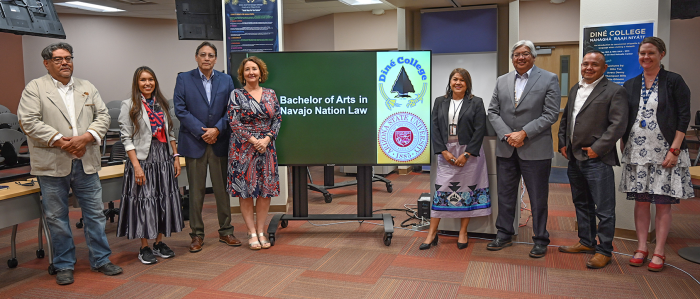ASU Law, Diné College, Navajo Nation partner on first-ever tribally affiliated legal program

Students gather in the courtyard of the Sandra Day O'Connor College of Law building in downtown Phoenix. Photo by FJ Gaylor
In a historic move in the advancement of legal education, the Sandra Day O'Connor College of Law at Arizona State University has announced a groundbreaking set of partnerships with the Navajo Nation and Diné College. These collaborations establish the world’s first tribally affiliated legal education by packaging four comprehensive law degrees uniquely tailored to meet the evolving legal needs of the Navajo Nation.
“This marks a milestone in reimagining legal education,” said Willard H. Pedrick Dean and Regents Professor of Law Stacy Leeds. “A top public law school, working collaboratively with a tribal college and an Indigenous nation, to empower the next generation of advocates, lawyers, leaders and legal scholars, by centering tribal-specific laws and sovereignty.”
The partnerships utilize each institution's expertise and resources to provide an unparalleled set of educational opportunities. The cornerstone of this initiative is a shared commitment to strengthening the Navajo Nation’s cultural traditions, sovereignty, legal system and self-governance while empowering future generations to address the legal challenges facing the Navajo Nation.
Bringing legal programs to Diné College has been discussed and planned for several years, involving the late Peterson Zah, the first president and last chairman of the Navajo Nation and ASU’s special advisor to the president on American Indian Initiatives. This initiative reflects a commitment to enhancing the community's educational opportunities and legal resources.
“We are taking a crucial step toward realizing the dream of a Navajo Nation law school, a vision passionately advocated by the late Dr. Peterson Zah and other leaders,” said Navajo Nation President Buu Nygren. “This program marks the next chapter in our journey to create a dedicated legal education system that respects and incorporates our traditions and laws.
“The establishment of these degree programs at Diné College and ASU Law honors Zah's legacy and brings us closer to a future where our legal professionals are trained to serve and uplift our nation.”
As part of this innovative approach to tribal legal education, Diné College announced today the creation of a Bachelor of Arts in Navajo law that will begin accepting students in fall 2024.
ASU Law simultaneously announced new emphasis areas in Navajo law within the following graduate legal programs: Master of Legal Studies and Master of Laws in tribal policy, law and government.
ASU Law and the Navajo Nation have a long-standing partnership to recruit and retain Navajo Nation citizens within ASU Law’s Juris Doctor program, which features an Indian law certificate program.
These four interrelated degree programs, offered individually by Diné College and ASU Law, will maximize student opportunities and offer several pathways designed to equip students with the necessary skills and knowledge to navigate complex legal landscapes, advocate for their community and contribute to the preservation and advancement of the Navajo Nation’s traditions and sovereignty.
The degree programs will collectively increase the number of legal professionals licensed to practice law on and around the Navajo Nation. Externship placements within the Navajo Nation government branches and agencies will be a hallmark of the program, within this initiative’s undergraduate, graduate and professional law degree programs.
"Our mission is to furnish students not only with theoretical knowledge but also with the practical acumen to effectively apply laws and legal processes within the Navajo Nation and beyond," said Charles "Monty" Roessel, president of Diné College. "This program serves as a beacon of hope, a testament to our steadfast commitment to advancing justice and sovereignty through education."
Since its inception, ASU Law has focused on supporting the Navajo Nation legal community. In the 1970s, founding ASU Law faculty member Judge William Canby worked to recruit Navajo students to ASU Law and taught the first Indian law course. Since 2010, ASU Law offers an annual Navajo Nation Law Continuing Legal Education conference in the fall.
Countless Navajo graduates from ASU Law have completed valuable externships with the Navajo Nation, contributing significantly to the legal community. Many of these graduates have worked within or are currently working on behalf of the Navajo Nation's legal department. Additionally, numerous ASU Law alumni advise clients before the Navajo Nation Judicial Branch and in administrative proceedings.
ASU Law’s Indian Legal Program was formalized in 1988 and has grown to become one of the most respected Indian law programs in the nation.
Like many rural areas of the United States, the Navajo Nation is classified as a legal desert, an area where there are not enough legal professionals to meet the needs of the population.
More Law, journalism and politics

Exhibit uses rare memorabilia to illustrate evolution of US presidential campaigns
After one of the most contentious elections in history, a new museum exhibit offers a historical perspective on the centuries-old American process.“We The People! Electing the American President” had…

TechTainment conference explores the crossroads of law, technology, entertainment
What protections do writers, actors, producers and others have from AI? Will changing laws around name, image and likeness (NIL) eliminate less lucrative college sports programs?And what does…

How to watch an election
Every election night, adrenaline pumps through newsrooms across the country as journalists take the pulse of democracy. We gathered three veteran reporters — each of them faculty at the Walter…
